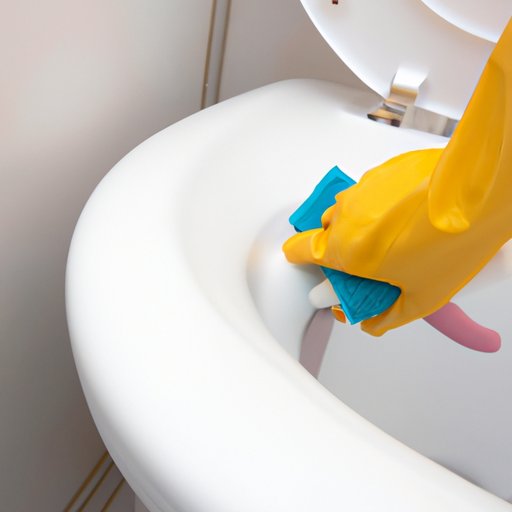
Introduction
Keeping a bathroom clean and hygienic is essential for maintaining good health and well-being. With daily use and exposure to moisture, bathrooms can accumulate dirt, grime, and bacteria quickly. Here, we offer a comprehensive guide to cleaning your bathroom, including easy-to-follow steps, natural cleaning solutions, deep cleaning tips, maintenance routines, and ways to keep your bathroom germ-free.
Step-by-Step Guide
The first step to cleaning a bathroom is to clear the clutter and remove all items from surfaces. This allows you to access all the areas that need cleaning and eliminates obstacles that can get in the way. Move on to dusting and wiping down surfaces with a microfiber cloth or a duster. Be sure to pay attention to areas like light fixtures, shelving, and cabinets, which can accumulate dust and hair.
The toilet bowl and surrounding areas should be addressed next. Use a toilet cleaner and a brush to thoroughly clean the inside and the outside of the bowl. Wipe down the seat, lid, and base with a disinfectant spray or a natural solution of vinegar and water. Don’t forget to clean the flush handle, toilet paper holder, and the surrounding floor.
Cleaning the shower/tub, sink, and mirror is the next step. Spray each surface with a cleaner, and use a cloth or a sponge to clean them. For a natural solution, mix baking soda and water into a paste and apply it to surfaces. For the sink, clean the faucet, handles, and drain with a soft brush. For the mirror, use glass cleaner and a microfiber cloth for streak-free results.
Finally, mopping the floor and putting everything back in place is the last step. Start from the furthest corner of the bathroom and work your way towards the door. Use a mop or a steam cleaner to clean the floor, and don’t forget to get into the corners and edges. Put all the items back in place, but be sure to discard any expired or unused products.
Chemical-Free Cleaning
Harsh chemicals can be damaging to both the environment and our health. Using natural alternatives like vinegar, baking soda, essential oils, and Castile soap can be just as effective and much safer. Mix equal parts vinegar and water for a multipurpose cleaner, or add essential oils like tea tree or lemon for their antibacterial properties. For toilet cleaning, sprinkle baking soda in the bowl and add vinegar for a bubbling effect.
Deep Cleaning
Deep cleaning is essential for maintaining a healthy and hygienic bathroom. Depending on the frequency of use, a bathroom can require a deep cleaning session once a month or every few months. A deep cleaning session addresses areas that are often overlooked in a standard cleaning routine, such as grout, showerheads, and fans. Use a toothbrush and a mixture of baking soda and water to scrub grout and tiles, and soak showerheads in vinegar to remove hard water buildup.
Quick and Easy Cleaning
If you’re short on time, a quick bathroom cleaning session is still better than no cleaning at all. Prioritize high-traffic areas that get the most use, like the toilet, sink, and mirror. Spray a multipurpose cleaner on these areas and wipe them down with a cloth or paper towel. Use a squeegee to quickly clean shower walls and glass surfaces, and a handheld vacuum to remove debris from the floor. Keep a basket of microfiber cloths and cleaning supplies within reach for easy access.
Maintenance Cleaning
Maintenance cleaning involves keeping a bathroom clean and tidy on a regular basis to prevent larger problems from developing. Daily routines like wiping down surfaces, keeping towels and bathmats dry, and putting things away can go a long way in maintaining a clean bathroom. Weekly routines like cleaning the toilet and sink and mopping the floor can prevent bacterial growth. Monthly routines like deep cleaning and decluttering can ensure that a bathroom is always guest-ready. Scheduling cleaning time in advance can promote consistency and accountability.
How to Keep Your Bathroom Germ-Free
Germs and bacteria can thrive in warm and moist environments, making bathrooms the perfect breeding ground. To keep your bathroom germ-free, disinfect high-touch surfaces like doorknobs, light switches, and faucet handles frequently. Use disposable towels or a designated cleaning cloth to avoid cross-contamination. Keep toothbrushes covered and stored away from others, and replace them every three to four months. Encourage family members to wash their hands frequently and to avoid leaving wet towels or clothing on the floor.
Conclusion
A clean and hygienic bathroom is essential for our health and well-being. By following the steps outlined in this guide, using natural cleaning solutions, deep cleaning regularly, establishing maintenance routines, and keeping germs at bay, you can have a clean and refreshing bathroom that you can be proud of.




